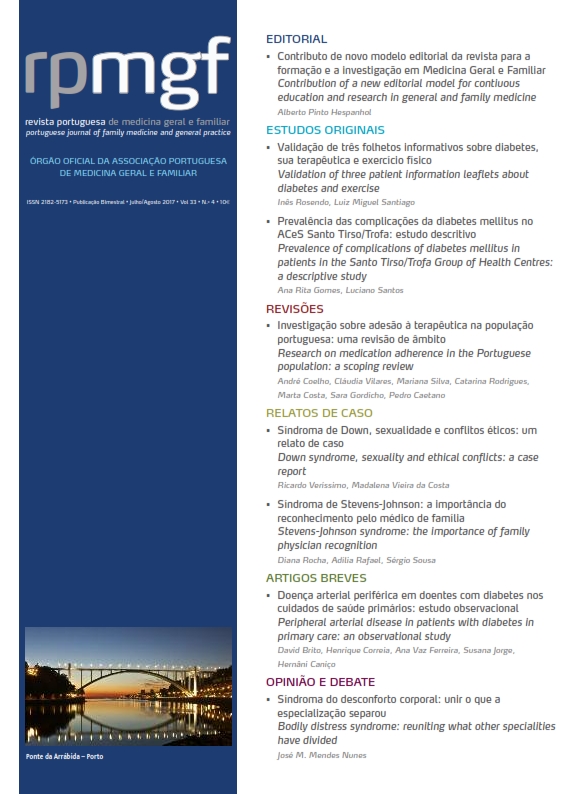Research on medication adherence in the Portuguese population: a scoping review
DOI:
https://doi.org/10.32385/rpmgf.v33i4.12226Keywords:
Medication adherence, Review, PortugalAbstract
Aim: To conduct a structured literature review describing the scope (quantity, focus, and nature) of published original research on medication adherence in the Portuguese population. Data sources: Studies on medication adherence were searched on MEDLINE, Web of Science, SciELO, and B-on. Methods: The scoping review was conducted in December 2014 using the data sources, searching for studies on medication adherence in the Portuguese population, conducted after 2005, and/or published until the end of 2014. Results: We identified 82 publications and 26 were selected for this review. Most studies were conducted on populations in the North and in the Lisbon and Tagus Valley Region. There were no studies on initiation of treatment and only one study on discontinuation. There was variability on the methods used for data collection and measures used for evaluation of adherence. Questionnaires were the main source of information. Adherence rates varied from 41.6% to 89%, depending on the disease or condition studied. Conclusions: The different methods used for data collection and evaluation of adherence, the short periods of time for data collection, and the exclusive analysis of the implementation of treatment disregarding the factors that determine initiation and discontinuation of treatment, hinder the study of medication adherence in the Portuguese population using recently published research.Downloads
Downloads
Published
Issue
Section
License
The authors will assign to the RPMGF the sole right to publish and distribute the content of the manuscript specified in this declaration via physical, electronic, broadcasting or any other medium that may come into existence. They also grant the RPMGF the right to use and exploit this manuscript, in particular by assigning, selling or licensing its content. This permission is permanent and takes effect from the moment the manuscript is submitted, has the maximum duration allowed by applicable Portuguese or international law and is of worldwide scope. The authors further declare that this assignment is made free of charge. If the RPMGF informs the authors that it is not going to publish their manuscript, the exclusive assignment of rights ceases forthwith.
The authors authorise the RPMGF (or any entity it may appoint) to act on their behalf when it believes that copyright may have been infringed.





